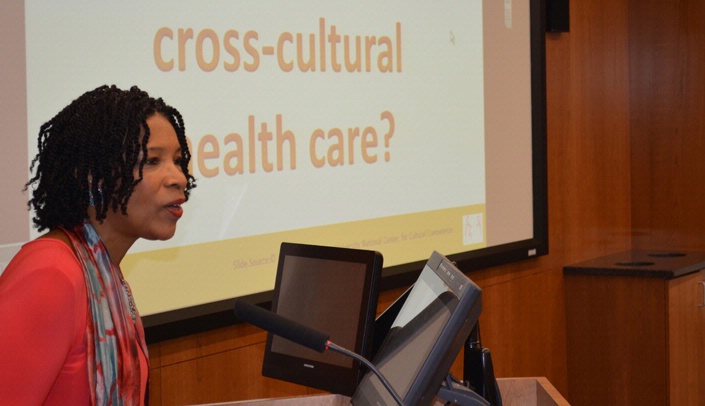Tawara Goode, the founding director of the National Center on Cultural Competency (NCCC) at Georgetown University in Washington, D.C., visited the UNMC campus last week to speak on “Addressing Cultural Competency and Cultural Diversity in an Academic Medical Setting.”
During the presentation, Goode noted that often we focus on race and ethnicity and sometimes exclude culture. The result can be inappropriately met needs and services for medical patients.
Award sponsors two-day visit
In addition to her Friday presentation, Goode’s two-day visit to UNMC was sponsored by Munroe-Meyer Institute’s LEND program with an award from the Interdisciplinary Technical Assistance Center on Autism and Developmental Disabilities at the Association of University Centers on Disability (AUCD).
With this funding, the LEND Program is working with Linda Cunningham, the division director of Employee Relations, Organizational Development & Diversity at UNMC, and Graciela Sharif, a parent in training for the position of LEND Cultural Diversity Coordinator, to improve cultural awareness and inclusive recruitment practices within the program. The strategies developed and implemented by the LEND Program will then be available as a model for other programs and units across campus with similar goals.
“Culture is applicable to all people, and it is not rooted only in race and ethnicity,” she said, adding that often, a person is unaware of their own culture until they are in a setting that is different from their own.
“We all have multiple cultural identities,” she said, discussing the impact of family, community, socio-political environment and other internal and external factors.”
For example, mental health has its own language, its own way of doing things, she said. “People need to be able to enter the culture.”
Goode spoke before a packed room at the Maurer Center for Public Health.
“We need to ensure that students have a solid understanding of and appreciation for culture, theirs and others,” Goode said, pointing to how biases, stereotyping and other “isms” “are alive and well in our society and we don’t like to talk about them.
“There is clear and compelling evidence about biases. . . and they have a really negative impact on health care,” she said. “We need to teach how to address both conscious and unconscious bias.”
Goode has developed initiatives and programs to facilitate the design, implementation, and evaluation of cultural and linguistic competency that address the needs of diverse audiences (e.g. health care, mental health, community organizations, professional societies, institution of higher education).
“Perceived discrimination and bias have an adverse effect on patient health and are closely linked to health and health care disparities,” she said. “We all have biases. The obligation of the health care professional is to become aware of your own biases.
During her visit, Goode also met with the UNMC Diversity Advisory Committee and Munroe-Meyer Institute’s Interdisciplinary Leadership Education in Neurodevelopmental and Related Disabilities (LEND) faculty, staff, and students, among other activities (see sidebar).
“The Munroe-Meyer Institute’s LEND Program was pleased to host Dr. Goode’s visit to UNMC,” says Cindy Ellis, M.D., LEND director. “Her expertise is invaluable as we strive to enhance cultural competency throughout our program and across the UNMC campus.”
